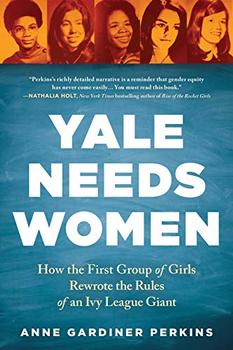Summary | Excerpt | Reading Guide | Discuss | Reviews | Beyond the Book | Readalikes | Genres & Themes | Author Bio

How the First Group of Girls Rewrote the Rules of an Ivy League Giant
by Anne Gardiner Perkins
Despite his national reputation, Brewster had lived his life behind the walls of a markedly insular world. A graduate of an all-boys prep school, Brewster had attended all-male Yale, where he'd met Vassar College junior Mary Louise Phillips, the daughter of a Yale man, at a fraternity party. They'd married the following year. As Yale's president, Brewster spent his days surrounded by men, and while the elegant dinner parties he hosted began with couples seated together, after the meal the men retired to the front parlor for brandy and conversation while the wives were shunted off elsewhere. For Brewster, the notion of two parallel spheres, one for men and one for women, was so deeply embedded in the structure of his days that it was hard to imagine an alternative.
"Kingman knew girls and women as someone apart," explained Associate Dean John Wilkinson, one of Brewster's inner circle. "He wasn't accustomed to women who were his equals." That perceived difference was at the center of Brewster's opposition to coeducation.
To Brewster, admitting women students threatened the central mission of Yale: graduating America's future leaders. By 1968, Yale had produced Supreme Court justices, a U.S. president, and a small army of U.S. senators, governors, and CEOs. Along with Harvard and Princeton, Yale was "widely viewed as the training grounds for the nation's leaders," wrote historian Jerome Karabel, and Yale would confirm that reputation twenty years later, when every U.S. president between 1989 and 2009 was a Yale man.
"We are a national institution whose ambition is nothing less than to try to frame a leadership for the nation," Brewster told Yale alumni in 1966, and admitting the right students was the key to attaining that goal. The role of the admissions office, Brewster instructed his staff, was to "make the hunchy judgment as to whether or not with Yale's help the candidate is likely to be a leader in whatever he ends up doing." Since women were not leaders, Brewster reasoned, they would be taking up limited spaces that could have gone to men.
If Brewster had wanted evidence of women's potential as leaders, all he had to do was look out his office window. Two blocks up at Yale's graduate school, future Federal Reserve chair Janet Yellen was getting her PhD in economics, while future UC Berkeley chancellor Carol Christ was getting hers in English. One block away, future secretary of state Hillary Rodham had just been accepted at Yale Law School, where future Connecticut Supreme Court chief justice Ellen Peters was on the faculty and future Children's Defense Fund founder Marian Wright Edelman had graduated six years earlier.
This blindness to women's potential as leaders was not Brewster's alone. Judging by Americans' choices at the polls, he was right in step with his era. In the fall of 1968, all 50 of the state governors were men, as were 99 of the 100 U.S. senators and all but 11 of the 435 members of the U.S. House of Representatives. Yale's brand was producing national leaders, and if examples of women leaders could not be found—despite women's exclusion to date from nearly every avenue to power—then Yale was going to waste as few admissions slots on women as possible.
Brewster was a skilled political tactician, and for the two years following Lanny Davis's editorial onslaught, he kept Yale students at bay by holding out the possibility of a sister school, a solution that would have brought women to New Haven without actually having to admit them to Yale. Brewster even tried for an entire year to convince all-women Vassar to abandon its campus in Poughkeepsie and move 120 miles east to New Haven. When that plan fell through, he was ready with another: Yale would happily build its own women's college—as soon as a donor stepped forward to pay the more than $30 million that Brewster said it would cost for the additional faculty, staff, and facilities. And there the issue sat, nicely stalled, until student adviser Derek Shearer got tired of waiting.
Excerpted from Yale Needs Women: How the First Group of Girls Rewrote the Rules of an Ivy League Giant by Anne Gardiner Perkins. © 2019 by Anne Gardiner Perkins. Used with permission of the publisher, Sourcebooks. All rights reserved.
Your guide toexceptional books
BookBrowse seeks out and recommends the best in contemporary fiction and nonfiction—books that not only engage and entertain but also deepen our understanding of ourselves and the world around us.